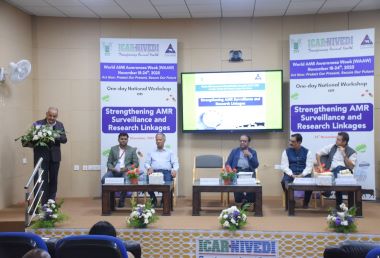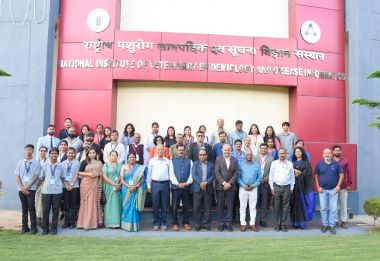24 November 2025, Bengaluru
ICAR- National Institute Of Veterinary Epidemiology And Disease Informatics organized a focused One-Day Workshop on “Strengthening AMR Surveillance and Research Linkages” as part of World AMR Awareness Week (WAAW) 2025, held under the theme “Act Now: Protect Our Present, Secure Our Future.” The workshop brought together experts from animal health, human health, environmental sciences, public health, and India’s innovation ecosystem to advance the country’s One Health-based AMR response. The Organizing Secretary, Dr. Shivasharanappa N, opened the event with an overview of the agenda and welcomed the gathering.
In his inaugural remarks, Dr. Suresh S. Honnappagol, Former Vice Chancellor, Karnataka Veterinary, Animal and Fisheries Sciences University and Former Animal Husbandry Commissioner, highlighted the urgent need to strengthen India’s inter-sectoral AMR surveillance architecture. He stressed that only a unified network linking livestock, human and environmental domains can ensure an effective One Health response to AMR.

Dr. Baldev R. Gulati, Director, ICAR-NIVEDI underlined that AMR has already emerged as a crisis of the present rather than a distant threat. He emphasized the need for immediate action to prevent serious consequences for the current generation and to safeguard future generations, noting that strengthened surveillance systems and coordinated national efforts remain essential.
Adding to the national perspective, Dr. Aniket Sanyal, Director, ICAR-NIHSAD, spoke about the critical importance of enhancing India’s reference laboratory systems and improving pathogen characterization capacity to build a stronger AMR intelligence network.
Field-level perspectives stressed the need for stronger linkages between diagnostics on the ground, laboratory networks, and research institutions to ensure AMR surveillance leads to actionable outcomes for state systems.
A keynote session focused on India’s rapidly advancing innovation ecosystem, highlighting how national platforms are enabling deep-tech solutions, novel diagnostics, and AI-based tools to strengthen AMR detection and response capacities.
From a policy and environmental standpoint, progress under state-level AMR action plans was outlined, including efforts to upgrade laboratories, enhance integrated surveillance platforms, and improve coordination across sectors. These initiatives were noted as scalable models that other states could replicate.

Representing the human health perspective, insights were shared on current priorities and persistent challenges in AMR surveillance within the medical sector.The technical sessions and panel discussion that followed underscored the need for integrated AMR data systems, stronger laboratory networks, enhanced translational research, and an expanded One Health surveillance architecture. The deliberations also emphasized the importance of mass awareness campaigns to promote responsible antimicrobial use across sectors.
The workshop concluded with a unified call to scale up AMR surveillance capacity, drive innovation, and strengthen coordination across national and state-level systems to effectively protect human, animal, and environmental health.
(Source: ICAR- National Institute of Veterinary Epidemiology And Disease Informatics, Bengaluru)







फेसबुक पर लाइक करें
यूट्यूब पर सदस्यता लें
X पर फॉलो करना X
इंस्टाग्राम पर लाइक करें